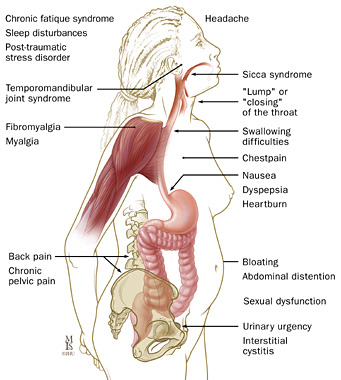Difference between revisions of "Irritable Bowel Syndrome (IBS)"
From Wikiwel
(→Home remedies) |
|||
| Line 1: | Line 1: | ||
| + | == Symptoms == | ||
[[File:Irritable Bowel Syndrome.jpg]]<br> | [[File:Irritable Bowel Syndrome.jpg]]<br> | ||
| − | == | + | == Causes == |
* lactose intolerance : If milk and other dairy products bother you, you may have lactose intolerance. This means that your body is unable to digest the sugar in milk. If you suspect you are lactose intolerant, limit the amount of dairy products in your diet, and talk to your doctor. | * lactose intolerance : If milk and other dairy products bother you, you may have lactose intolerance. This means that your body is unable to digest the sugar in milk. If you suspect you are lactose intolerant, limit the amount of dairy products in your diet, and talk to your doctor. | ||
* aspartame is known to cause Irritable Bowel Syndrome and [[fibromyalgia]]. | * aspartame is known to cause Irritable Bowel Syndrome and [[fibromyalgia]]. | ||
Revision as of 06:23, 11 January 2013
Symptoms
Causes
- lactose intolerance : If milk and other dairy products bother you, you may have lactose intolerance. This means that your body is unable to digest the sugar in milk. If you suspect you are lactose intolerant, limit the amount of dairy products in your diet, and talk to your doctor.
- aspartame is known to cause Irritable Bowel Syndrome and fibromyalgia.
- Foods that tend to aggravate IBS include wheat, rye, barley, beans, cabbage, some fruits, chocolate, alcohol, milk and caffeinated beverages.
- Anxiety has been linked with IBS. Make sure you’re getting enough sleep at night, and if possible, try to clear a little time in your day to relax and enjoy yourself. Some people claim that therapy can help with IBS symptoms.
- Magnesium deficiency has been linked with IBS.
- Genetically-modified organisms (GMOs), wheat gluten, refined sugars and flours, hydrogenated oils, artificial flavors, and pesticides all contribute to IBS in some way, shape, or form.
Home remedies
- Coriander works like an antispasmodic drug, relaxing the contracted digestive muscles that cause the discomfort of IBS and other “overactive gut” disorders.
- Healthy intestinal flora bestows resistance to intestinal disorders such as constipation, diarrhea, diverticulitis, irritable bowel disease, ulcerative colitis (UC), Crohn's Disease, leaky gut syndrome, autoimmunity, and colon cancer.
- turmeric is a remedy for gastrointestinal discomfort associated with irritable bowel syndrome and other Digestive Disorders.
- As with heartburn, avoid large meals and eating too fast.
- Add more fiber to your diet : Fiber helps regulate diarrhea and constipation. Soluble fiber, in particular, can be very effective. Foods high in soluble fiber include apples, beans and citrus fruits. Don’t try to cheat with fiber supplements – these can actually make symptoms worse.
- Probiotics can reverse ulcers, irritable bowel syndrome, Crohn's disease, ulcerative colitis, inflammatory bowel disease, and other gut inflammations that occur from a lack of sufficient probiotics.
- Magnesium and Vitamin C helps promote healthy bowel function.
- Try to de-stress, in whatever way possible.
- Exercise : Studies show that people who weigh less and are more physically fit report less abdominal pain than those who are heavier. Also, for a lot of people, exercise is a great way to reduce stress.
- Glutamine : even serious gastrointestinal and digestive diseases such as Crohn's, IBS and Colitis can see substantial improvement with glutamine supplementation.
- a traditional Chinese medicinal tea composed of fennel, flax, and fenugreek, is known to help treat coughs and cold, mucus buildup, Irritable Bowel Syndrome (IBS), and Crohn's Disease.
- Neem Tree is very powerful against irritable bowel syndrome.
- Bromelain is a popular natural digestive aid due to it's ability to digest proteins. It's used for bloating, gas and other digestive symptoms and for conditions such as irritable bowel syndrome.
- Cat's Claw is used to effectively handle digestive problems such as gastric or duodenal ulcers, irritable bowel syndrome, colitis, and leaky bowel syndrome
- Aloe Vera : Patients with irritable bowel syndrome (IBS) can derive much benefit from supplementing with aloe vera juice, gel, or dried flakes.
- eating 2 kiwifruit a day for a month significantly “shortens colon transit time, increases defecation frequency, and improves bowel function” in those with constipation-type IBS.
- peppermint oil and pills has been shown helpful in controlled trials.
- Digestive enzymes : A good digestive enzyme supplement can also help ease IBS by improving the efficiency of your digestive system. When food has not been digested as much as possible before reaching the small intestine, it can cause great discomfort and hinder the entire elimination process. Taking a high quality digestive enzyme supplement that contains components such as bromelain (naturally found in pineapple), lipase, pancreatin, papain and pepsin can really help increase the efficiency of digestion. By breaking the food down as much as possible earlier in the process, you may avoid a lot of the uncomfortable symptoms that come later on in the intestine.
- Acupuncture
- zinc L-carnosine is used to cure gastroesophageal reflux disease (GERD), gastritis, ulcers, leaky gut, and IBS.
Warnings
References
Medical Disclaimer
This information is not meant to be substituted for medical advice. Always consult a medical professional regarding any medical problems and before undertaking any treatment or dietary changes.
